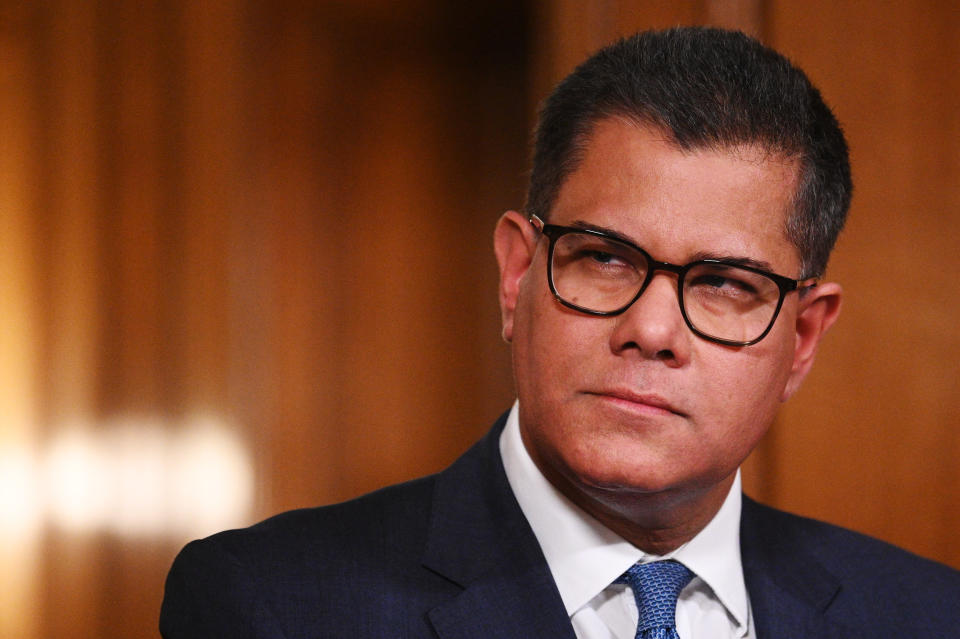‘The vaccine isn’t here yet’: NHS chief urges people to stick to lockdown after new COVID cases soar by 33,470 in a single day


There were a record 33,470 new cases of coronavirus in the UK on Thursday, as the medical director of the NHS warned the “vaccine isn’t here yet.”
The number of cases is a significant jump from the previous few days which have hovered around 22,000. There were 22,950 cases on Wednesday.
It brings the total number of cases in the UK to 1,290,195.
The medical director of NHS England professor Stephen Powis told a Downing Street press conference “it might feel like the calvary is coming and we can relax about the restrictions” but he added it was “vital” two follow the coronavirus guidance around ‘hands face and space’ and testing.
Watch: Sharma pressed over post-Brexit concerns for vaccine supply chain
He said: “There is hope on the horizon with a vaccine, and of course that is welcome news, but the vaccine is not here yet and it will not help us in this second wave if infections continue to rise.”
Professor Powis said there were now more than 12,700 people in hospital with coronavirus in England – up from 3,827 one month ago.
He told a Downing Street press conference: “That number will, unfortunately, continue to rise if infection rates continue to increase in our communities.

Read more: Test and Trace sees highest cases ever after nearly 150,000 weekly positive tests
“Sadly while treatments and therapies have indeed improved, more infections inevitably also mean more deaths and more people suffering from the debilitating effects of long Covid.”
Professor Powis said the NHS is preparing for the rollout of a coronavirus vaccine once one becomes available.
He said: “We are working incredibly hard and I am confident that the NHS will be up to what will be a huge logistical challenge. We have for flu every year, we will be able to do it for Covid.”
Professor Powis defended the decision to cancel procedures during the first wave of coronavirus, insisting that capacity was needed to deal with Covid-19 cases.
He said: “As infection rates rise and hospitals come under pressure – we have seen that in areas of the country with high community rates – then once again there is a possibility that elective care gets affected.
“Our staff don’t want that to happen, our staff want to get on, treat people who are on waiting lists and make sure those waiting lists come down.”
Read more: Jacob Rees-Mogg calls anti-vaxxers 'nutters'
He added: “If the public once again, as we did in the spring, keep to the guidance, drive down infection rates, then that is the best way to ensure that the NHS can do what it always does, which is to treat everybody with Covid, people who don’t have Covid, ensure that those waiting times don’t increase and that we can get on and manage the backlog.”
Experts have previously warned that describing the daily figure as a record could be “misleading” as it is not clear how many people were actually infected during the height of the first wave, due to a lack of community testing at the time.
There had been some suggestion in recent days that cases numbers were levelling off and the lockdowns across the UK were having a significant effect, but the latest figures complicates the picture.
England only went into lockdown a week ago and there is often a reasonable lag time between infection and someone seeking out a test.
Responding to a question about the jump in infections Professor Powis said the weekly average was just above 22,000 and it was important to look at data over a long period of time.
He said: “Don’t look a single day and don’t look at a single data set”
Business Secretary Alok Sharma noted the number of hospital admissions for coronavirus patients was rising, he said there were now 14,196 patients receiving treatment in hospital compared to 12,406 last week.
He said there were 1,219 on ventilators compared to 1,142.
Sharma said: "This is a reminder to us about why we are taking action to stop the spread of the virus.”
Sharma also announced £2.2 billion was being distributed to councils to fund grants for firms forced to close as a result of lockdown measures.
The Government has already announced grants of up to £3,000 a month for businesses ordered to shut.
Sharma told the press conference: “These will benefit 600,000 business premises.
“I can confirm today that we will be distributing £2.2 billion to local authorities tomorrow to allow them to make these vital grant payments to businesses which have been affected.”
The economy grew by 15.5% between July and September and is officially out of recession, but it still 8.2% smaller than it was in February.
Watch: These are the exceptions for going outside during England's second national lockdown
Coronavirus: what happened today
Click here to sign up to the latest news and information with our daily Catch-up newsletter

 Yahoo Finance
Yahoo Finance 